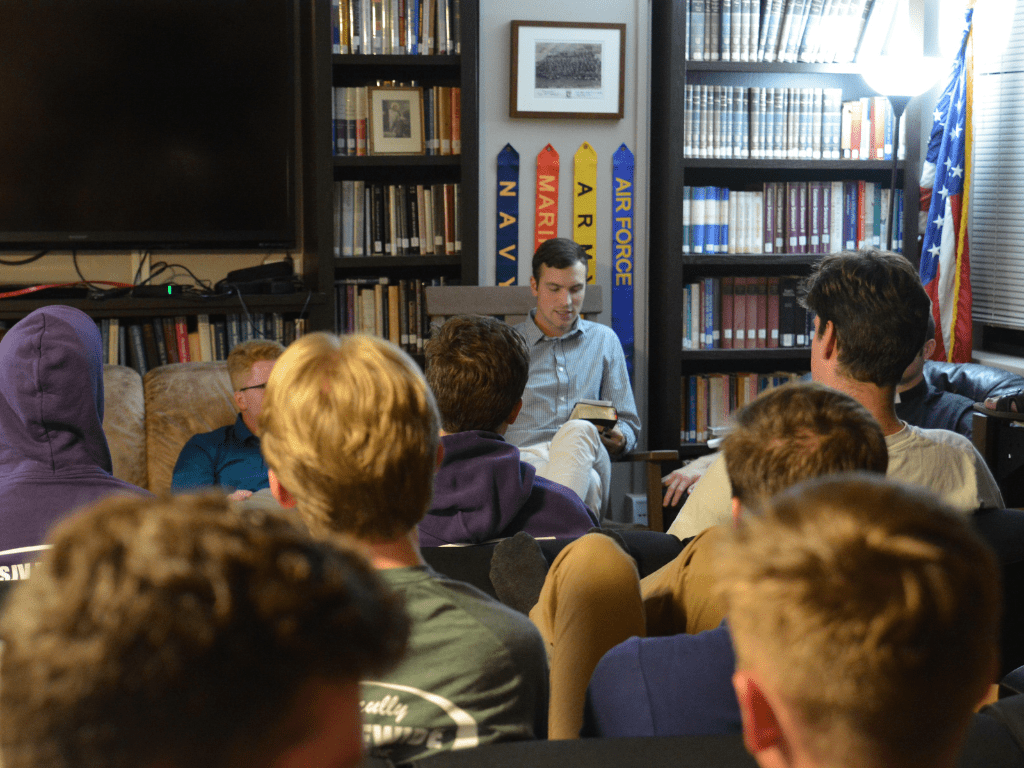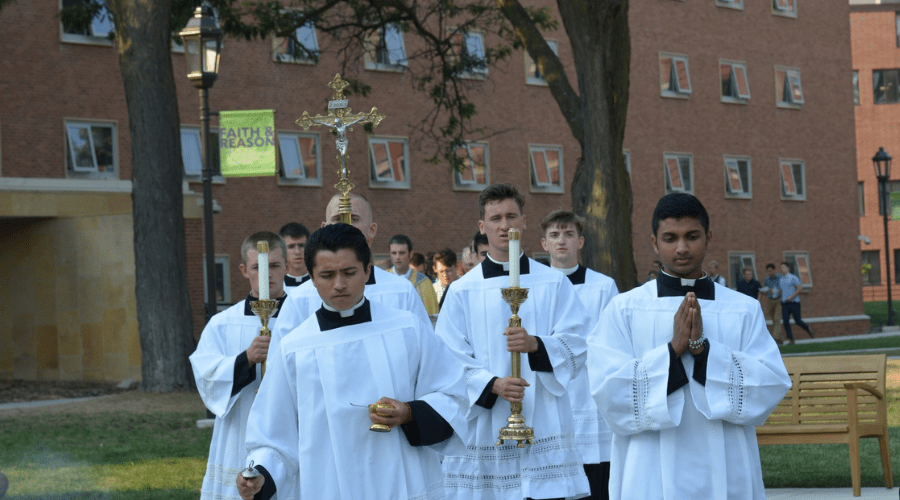
Caleb Kosch admits to feeling more than a little overwhelmed during his first few days at Saint John Vianney College Seminary.
Here’s your hour-by-hour schedule, known in the seminary world as an horarium (translated “schedule,” inspired by St. Benedict and the way he and his monks ordered their lives). Here’s your dorm – don’t close the door unless you’re changing or sleeping. Here’s your flip phone; it makes calls, sends and receives texts, has a map app and plays music. That’s it.
Yes, entering a countercultural existence can come with some culture shock. But the seminary is structured in such a way that help with the transition comes from fellow seminarians who went through the same process not so long ago.
“The first guys you start to meet when you arrive are the seniors, which I feel like is the opposite in most scenarios,” said Kosch, now a senior from the Archdiocese of Omaha. “They actually invested their time into us, hearing our stories and asking how we’re doing.
“It was a joy to have them look out for us.”
Leadership of the first follower
Today, that’s Kosch’s job. As one of three residential assistants – yep, RA, who has been chosen by his peers, and a priest – his final year of discernment at college seminary includes leading a floor of fellow young men discerning the priesthood.
Each of the seminary’s floors has an RA and a priest formation adviser. The RAs oversee a group of “trainers,” who are in charge of 4-5 “new men” throughout the year.
The older men learn how to become servant leaders by developing relationships and showing the youngsters the ropes. The freshmen and other newcomers get the lay of the land not just from those at the top of the organizational chart, but from their fellow seminarians.
All of our seniors exercise leadership,” SJV Rector Fr. Jonathan Kelly said. “Some by being RAs, some through other leadership positions, and others by supporting their decisions. It is a principle called the ‘leadership of the first follower.’ This kind of support from your peers increases confidence and brings out your best. It also leads to greater unity as the whole is always greater than the sum of its parts.”
One in three seminarians at SJV go on to become Catholic priests. Many more become husbands, fathers and workers. All of them, in some way, will be expected to lead.
“It will prepare them,” Kelly said. “Their time is not their own.”

Each floor meets once a week, and each trainer meets with his group separately once or twice a week through Thanksgiving. The floors have their own periodic outings – a trip to a local state park for a hike or an evening out bowling
– and often compete against each other in recreational sports.
The seminary’s “open door policy” ensures plenty of open, honest dialogue – from the necessary fraternal correction of
upperclassmen to deep conversations about vocation and discernment.
“It’s a really cool atmosphere,” said senior Marty Longsdorf, another RA who comes from the Archdiocese of St. Paul and Minneapolis. “There’s been a couple of really awesome conversations I’ve had with guys on the floor … there’s a couple of guys that you’re able to see that they need something and check in with them and even pray with them, too; that has been super fruitful.”
Balance and respect
Of course, this is still a dorm full of 18-22-year-old men. The seriousness of formation, discernment, and intense philosophical study are balanced with good, old-fashioned fun.
“Yeah,” Kosch smiled. “It’s pretty much a college dorm floor – guys being a little chaotic.
“But it’s also a place of deep community.”
It’s against this backdrop, Kelly says, that men are able to become true disciples. The roadmap laid out in Catholic seminary formation calls for a man to grow from self-awareness to self-possession to self-gift.
That’s the definition of “leadership” SJV seeks to instill in its future priests, husbands, fathers and single laymen.
“I think the buy-in and the leadership of the older upperclassmen and their willingness to follow it is what inspires the younger men,” Kelly said. “The force of a good example … is important in any community. And one of my favorite definitions of authority is ‘if someone’s willing to do what you ask of them, for no other reason than you asked him to do it.’ That’s the kind of authority that they’re exercising — not because they’re going to punish them, but just because they asked him to do it.’
“That’s respect.”
